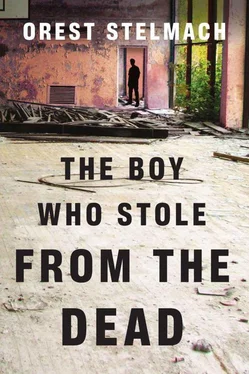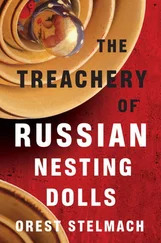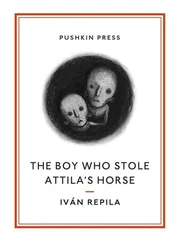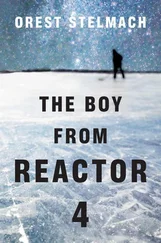Nadia marched into the ladies’ room. It was empty. She locked herself in a stall. Slipped out of her blazer, skirt, and blouse. Took new clothes out of her canvas bag. Put on a sweater, jeans, and a light jacket. Wrapped a black scarf around her hair and put on her sunglasses. It was the same scarf she’d used to escape the Caves Monastery in Kyiv last year. She’d packed it as a precaution and for good luck. She grabbed her purse and stuffed the rest of the clothes in the canvas bag. Left the bag in the stall.
She walked out of the restroom and turned right, away from the front door. A tray clattered outside. A woman shrieked. Something crashed to the ground. Men shouted.
Marko had taken down the man with the pointed chin, she thought. Just as they’d planned.
Nadia burst through a door marked “Employees Only.”
One cook stood poised over five omelets. Another hovered over ten pancakes. A server turned to Nadia. It was the same woman who’d taken their order. She showed no signs of recognizing Nadia.
“I can’t go back out there,” Nadia said. “My boyfriend said he’s going to kill me. Is there a back door?”
Stunned faces. The server pointed to a door behind a stack of potato sacks.
Nadia hurried out of the restaurant. She emerged in an alley beside empty vegetable crates and a dumpster. A pile of ashes and a zillion cigarette butts. Even though she’d changed clothes, Nadia preferred not to be seen exiting the rear of the eatery. At least one man would be watching the back street. She was sure of it.
She cut right across an alley joining the adjacent buildings. The last building had a sign on the rear entrance. Central Square Hostel. A man was wheeling boxes from a laundry company inside. He paid no attention to Nadia.
She turned left down an access road for deliveries and emerged one block north and half a block east of where she’d been sitting. A quick glance left. A delivery van blocked her view. She craned her neck. Quickly snapped it back. The Renault was parked near the back of the restaurant, a block away.
Nadia marched in the opposite direction, north by northwest, block by block, without consulting her map. She only had to travel a mile to get to her destination. She knew from memory she was heading in the right direction. It didn’t matter if she was off a block or two from the optimal course.
After ten minutes of walking, the neighborhood turned residential. Neoclassical apartment buildings lined one-way streets. Cars parked diagonally on one side of the road, bumpers pointed toward the curb. A smattering of pedestrians hurried to work. Nadia stopped near two mothers chatting beside a day care center to consult a map. There were no cars or pedestrians behind her. She was certain she’d lost both tails. She oriented herself and moved on.
She arrived on Yakova Rappaporta Street ten minutes later. A red-and-yellow brick castle with a silver dome towered over the other buildings. It looked like a mosque but contained etchings of the Star of David above some of its windows.
Yakova Rappaporta became Vilna Street. Vilna was the Ukrainian word for “free,” as in freedom. Karel’s apartment was located in a three-story stone building with a wrought iron balcony overlooking a grove of trees planted along the sidewalk. Blue and black graffiti marred the walls.
Nadia entered a foyer through a red wooden door. She found the name Karel Mak next to a buzzer for apartment #3B. She rang the buzzer several times. No one answered. She’d prepared for the possibility he wouldn’t be home, or answer his doorbell if the visitor didn’t have an appointment. Nadia rang the buzzer marked “office.”
A cranky woman answered. “Who’s there?”
“I’m looking for Karel Mak. I’m a friend of his.”
“Impossible. Karel has no friends. Go away.” The static died.
Nadia counted to ten. Pressed the buzzer again.
“Who’s there?”
“I really am a friend of Karel’s. I’m from America. I met him last year—”
“Impossible. Karel’s never been to America. Go away.” The static died again.
If the woman knew he’d never been to America, that meant they were friends. Nadia didn’t wait this time. She pressed the buzzer three times in rapid succession.
“I’m calling the police,” the woman said. Furious now.
“I didn’t meet him in America. I met him in Chornobyl village.”
A pause. Three seconds later a louder buzzer sounded. The door unlocked. Nadia walked into a foyer. A hallway led to apartments. A staircase led upstairs. There was no elevator.
A door opened down the hallway. A svelte old woman stepped out. She had sunken cheekbones and wary eyes. From a distance she looked middle-aged but up close she looked ancient. The lines in her face contrasted with her brown hair color.
She wiped her hands on an apron. “I’m making breakfast. Come, kotyku . Come.”
Kotyku was the endearment Nadia’s mother had used growing up. It meant “kitten.” The sound of the word slowed Nadia’s pulse.
She followed the woman to her apartment. A mezuzah was attached to the doorframe. Nadia had learned about it from her Jewish neighbors in New York City. It was a small case that contained a piece of parchment with a passage from the Torah. The mezuzah fulfilled the Biblical requirement to post the specified passage at the entry to one’s home.
Nadia stepped inside. The woman closed the door. She turned and pointed a pistol at Nadia with both hands. They shook lightly.
“I survived the Lviv ghetto. I’ll survive you. Now who are you and what do you want with my son?”
CHAPTER 35

THE GENERAL COULD barely contain his euphoria. He’d been waiting for this morning for a month since making arrangements for her arrival. He could tell from the website she was a temptress. A seductress. The man who had the privilege to hold her, use her, and possess her would realize new heights of pleasure. Of that he was certain.
His wife understood he had passions even age couldn’t extinguish. He had to give her credit for that. At first she balked when he told her he was building an enormous studio behind their mansion. It would look hideous beside the English garden, she said. But then he explained the benefits of its creation. He would travel less often. He’d get satisfaction in his home as opposed to seeking recreation outside it. This was the type of compromise that prolonged marriages, he explained. He told her he was going to sound-proof the studio. That he would host visitors, on occasion. And that she should never step foot into that building if she valued her life.
When he told her precisely what he’d be doing in the studio she finally understood. Marriage was not his primary fulfillment. He could see the look of resignation in her eyes. The realization that his trips abroad had not been merely business, but the source of the joy that kept him alive. Alive, by God, like a man was supposed to feel.
The General sipped his coffee at the desk beside the king-sized bed in the studio. The bedroom flanked the living room which opened up into a small kitchen. A wall separated the living quarters from the rest of the studio which was comprised of a single ballroom.
He stepped into the ballroom, cup in hand. Two partitions formed a triangle against a side wall. She was there, waiting quietly for him, the way a good mistress should. He loved this moment. The sense of anticipation. Prolonging that moment of rapture when he first put his hands on her—
His cell phone rang.
He cursed it. Walked to the kitchen, put his cup down, and answered it.
Читать дальше













